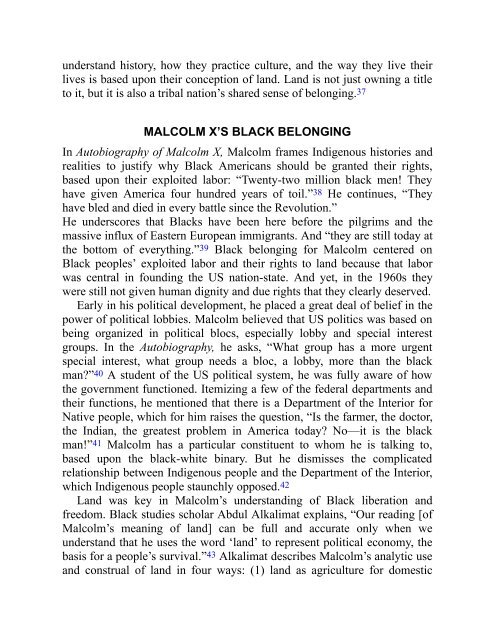Create successful ePaper yourself
Turn your PDF publications into a flip-book with our unique Google optimized e-Paper software.
understand history, how <strong>the</strong>y practice culture, and <strong>the</strong> way <strong>the</strong>y live <strong>the</strong>ir<br />
lives is based upon <strong>the</strong>ir conception <strong>of</strong> land. Land is not just owning a title<br />
to it, but it is also a tribal nation’s shared sense <strong>of</strong> belonging. 37<br />
MALCOLM X’S BLACK BELONGING<br />
In Autobiography <strong>of</strong> Malcolm X, Malcolm frames <strong>Indigenous</strong> histories and<br />
realities to justify why Black Americans should be granted <strong>the</strong>ir rights,<br />
based upon <strong>the</strong>ir exploited labor: “Twenty-two million black men! They<br />
have given America four hundred years <strong>of</strong> toil.” 38 He continues, “They<br />
have bled and died in every battle since <strong>the</strong> Revolution.”<br />
He underscores that Blacks have been here before <strong>the</strong> pilgrims and <strong>the</strong><br />
massive influx <strong>of</strong> Eastern European immigrants. <strong>An</strong>d “<strong>the</strong>y are still today at<br />
<strong>the</strong> bottom <strong>of</strong> everything.” 39 Black belonging for Malcolm centered on<br />
Black peoples’ exploited labor and <strong>the</strong>ir rights to land because that labor<br />
was central in founding <strong>the</strong> US nation-state. <strong>An</strong>d yet, in <strong>the</strong> 1960s <strong>the</strong>y<br />
were still not given human dignity and due rights that <strong>the</strong>y clearly deserved.<br />
Early in his political development, he placed a great deal <strong>of</strong> belief in <strong>the</strong><br />
power <strong>of</strong> political lobbies. Malcolm believed that US politics was based on<br />
being organized in political blocs, especially lobby and special interest<br />
groups. In <strong>the</strong> Autobiography, he asks, “What group has a more urgent<br />
special interest, what group needs a bloc, a lobby, more than <strong>the</strong> black<br />
man?” 40 A student <strong>of</strong> <strong>the</strong> US political system, he was fully aware <strong>of</strong> how<br />
<strong>the</strong> government functioned. Itemizing a few <strong>of</strong> <strong>the</strong> federal departments and<br />
<strong>the</strong>ir functions, he mentioned that <strong>the</strong>re is a Department <strong>of</strong> <strong>the</strong> Interior for<br />
Native people, which for him raises <strong>the</strong> question, “Is <strong>the</strong> farmer, <strong>the</strong> doctor,<br />
<strong>the</strong> Indian, <strong>the</strong> greatest problem in America today? No—it is <strong>the</strong> black<br />
man!” 41 Malcolm has a particular constituent to whom he is talking to,<br />
based upon <strong>the</strong> black-white binary. But he dismisses <strong>the</strong> complicated<br />
relationship between <strong>Indigenous</strong> people and <strong>the</strong> Department <strong>of</strong> <strong>the</strong> Interior,<br />
which <strong>Indigenous</strong> people staunchly opposed. 42<br />
Land was key in Malcolm’s understanding <strong>of</strong> Black liberation and<br />
freedom. Black studies scholar Abdul Alkalimat explains, “Our reading [<strong>of</strong><br />
Malcolm’s meaning <strong>of</strong> land] can be full and accurate only when we<br />
understand that he uses <strong>the</strong> word ‘land’ to represent political economy, <strong>the</strong><br />
basis for a people’s survival.” 43 Alkalimat describes Malcolm’s analytic use<br />
and construal <strong>of</strong> land in four ways: (1) land as agriculture for domestic


















